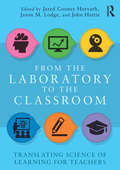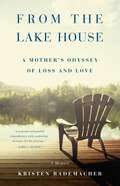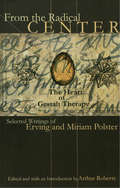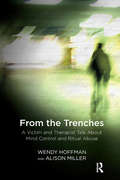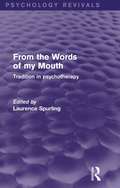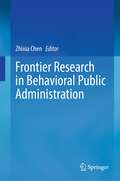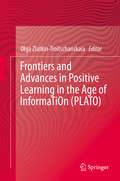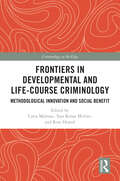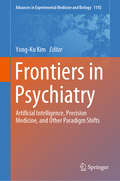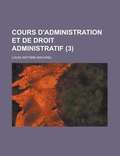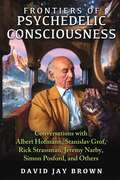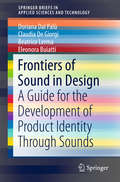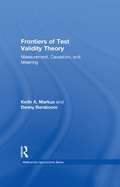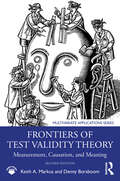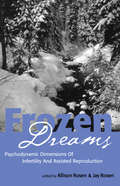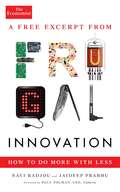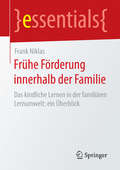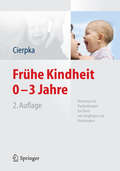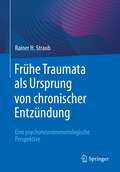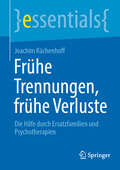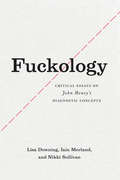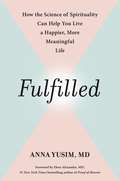- Table View
- List View
From the Laboratory to the Classroom: Translating Science of Learning for Teachers
by John Hattie Jared Cooney Horvath Jason M. LodgeOver recent years the field of Science of Learning has increased dramatically. Unfortunately, despite claims that this work will greatly impact education, very little research makes it into teacher practice. Although the reasons for this are varied, a primary concern is the lack of a proper translation framework. From the Laboratory to the Classroom aims to consolidate information from many different research disciplines and correlate learning principles with known classroom practices in order to establish explanatory foundations for successful strategies that can be implemented into the classroom. It combines theoretical research with the diverse and dynamic classroom environment to deliver original, effective and specific teaching and learning strategies and address questions concerning what possible mechanisms are at play as people learn. Divided into five sections, chapters cover: A Framework for Organizing and Translating Science of Learning Research Motivation and Attention as Foundations for Student Learning Memory and Metamemory Considerations in the Instruction of Human Beings Science of Learning in Digital Learning Environments Educational Approaches for Students Experiencing Learning Difficulties and Developmental Characteristics of Gifted Children Brain, Behaviour and Classroom Practice Forging Research/Practice Relationships via Laboratory Schools This fascinating text gathers an international team of expert scientists, teachers, and administrators to present a coherent framework for the vital translation of laboratory research for educational practice. Applying the Science of Learning framework to a number of different educational domains, it will be an essential guide for any student or researcher in education, educational psychology, neuropsychology, educational technology and the emergent field of neuroeducation.
From the Lake House: A Mother's Odyssey of Loss and Love
by Kristen RademacherDizzy with grief after a shattering breakup, Kristen did what any sensible thirty-nine-year-old woman would do: she fled, abandoning her well-ordered life in metropolitan Boston and impulsively relocating to a college town in North Carolina to start anew with a freshly divorced southerner. Dismissing the neon signs that flashed Rebound Relationship, Kristen was charmed by the host of contrasts with her new beau. He loved hunting and country music, she loved yoga and NPR; he worried about nothing, she worried about everything. The luster of her new romance and small-town lifestyle soon—and predictably—faded, but by then a pregnancy test stick had lit up. As Kristen&’s belly grew, so did her concern about the bond with her partner—and so did a fierce love for her unborn child. Ready or not, she was about to become a mother. And then, tragedy struck. Poignant and insightful, From the Lake House explores the echoes of rash decisions and ill-fated relationships, the barren and disorienting days an aching mother faces without her baby, and the mysterious healing that can take root while rebuilding a life gutted from loss.
From the Radical Center: The Heart of Gestalt Therapy
by Erving Polster Miriam PolsterThis remarkable collection traces central themes in the work of Erving and Miriam Polster, two of the best-known and best loved Gestalt therapists in the world. The writings herein span 4 decades in the history of psychotherapy, bringing together practical, theoretical and aesthetic dimensions of the Polsters' work in a single book. Ranging across diverse subjects and distinct historical periods, the work collected in this volume will educate, provoke, inspire and nourish Gestalt therapists for years to come.
From the Trenches: A Victim and Therapist Talk about Mind Control and Ritual Abuse
by Wendy HoffmanThis book is a shaking read, its controversial political statement putting forward the demand that readers accept the existence of conscious splitting of personality through treachery, deception, betrayal, torture, and violence. Beginning with the introductory poem, the book is an outcry about the significance of personal freedom as well as a blazing plea for commitment to making these abuses known and helping victims achieve safety and healing. The two authors present victims' horrendous experiences in a rational, factual, and professional way, building a foundational knowledge regarding what mind control is, how it uses deceit and lies, and how through betrayal and attachment trauma the basis is laid for lifelong exploitation. The authors present the terrifying and horrible situations that children are exposed to as they are coerced into actions that go against their own beliefs and true natures. The cooperation of the two authors, client and therapist, based on mutual respect, serves as a model for every change process: solidarity, freedom, and equality
From the Words of my Mouth: Tradition in Psychotherapy (Psychology Revivals)
by Laurence SpurlingAs a psychotherapist, in whose name do I speak? How can I come to speak in my own name? What does ‘tradition’ mean in psychotherapy? Originally published in 1993, the contributors to this book – all practising psychotherapists and teachers – explore these questions and investigate how theories and practices are passed on from one generation to the next. Their responses range over questions of training and indoctrination, the idea of tradition in the thought of Freud, Jung and Winnicott, and the implications of these questions for the practice of psychotherapy. It will be of special interest to psychotherapists and counsellors, as well as students and teachers of therapy. With its emphasis on how psychotherapy might gain by seeing its connections to other traditions, such as literature, philosophy and the creative arts, the book will also appeal to a wider readership.
Frontier Research in Behavioral Public Administration
by Zhixia ChenThis book mainly summarizes and analyzes the advanced research progress in the field of behavioral public administration, and also looks forward to the future of related academic research. It helps readers to quickly grasp the frontiers and latest developments in the field of behavioral public administration. It is benefit for readers to learn the hot topics, issues, and research methods, improving their research ability. It not only includes the frontier progress in western culture but also includes the researches in China.
Frontiers and Advances in Positive Learning in the Age of InformaTiOn (PLATO)
by Olga Zlatkin-TroitschanskaiaResearch on students’ media use outside of education is just slowly taking off. Influences of information and communication technologies (ICT) on human information processing are widely assumed and particularly effects of dis- and misinformation are a current threat to democracies. Today, higher education competes with a very diverse (online) media landscape and domain-specific content from sources of varying quality, ranging from high-quality videographed lectures by top-level university lecturers, popular-scientific video talks, collaborative wikis, anonymous forum comments or blog posts to YouTube remixes of discipline factoids and unverified twitter feeds. Self-organizing learners need more knowledge, skills, and awareness on how to critically evaluate quality and select trustworthy sources, how to process information, and what cognitive, affective, attitudinal, behavioral, and neurological effects it can have on them in the long term. The PLATO program takes on the ambitious goal of uniting strands of research from various disciplines to address these questions through fundamental analyses of human information processing when learning with the Internet. This innovative interdisciplinary approach includes elements of ICT innovations and risks, learning analytics and large-scale computational modelling aimed to provide us with a better understanding of how to effectively and autonomously acquire reliable knowledge in the Information Age, how to design ICTs, and shape social and human-machine interactions for successful learning. This volume will be of interest to researchers in the fields of educational sciences, educational measurement and applied branches of the involved disciplines, including linguistics, mathematics, media studies, sociology of knowledge, philosophy of mind, business, ethics, and educational technology.
Frontiers in Developmental and Life-Course Criminology: Methodological Innovation and Social Benefit (Criminology at the Edge)
by Catia Malvaso, Tara Renae McGee, and Ross HomelFrontiers in Developmental and Life-Course Criminology advances the field of developmental and life-course criminology (DLC) by highlighting some recent methodological innovations, and exploring the ways in which DLC criminologists are helping to bridge the gap between science and service by their engagement with policymakers and government and non-government agencies. The book is united by three related themes: the use of new data sources including government administrative data systems, the development of intervention and prevention strategies grounded in DLC research, and resilience, prosocial behaviour, and strengths-based approaches. This book opens up new possibilities for the future of DLC research, orienting the DLC field as one that prioritises the achievement of better outcomes for individuals and society.
Frontiers in Psychiatry: Artificial Intelligence, Precision Medicine, and Other Paradigm Shifts (Advances in Experimental Medicine and Biology #1192)
by Yong-Ku KimThis book reviews key recent advances and new frontiers within psychiatric research and clinical practice. These advances either represent or are enabling paradigm shifts in the discipline and are influencing how we observe, derive and test hypotheses, and intervene. Progress in information technology is allowing the collection of scattered, fragmented data and the discovery of hidden meanings from stored data, and the impacts on psychiatry are fully explored. Detailed attention is also paid to the applications of artificial intelligence, machine learning, and data science technology in psychiatry and to their role in the development of new hypotheses, which in turn promise to lead to new discoveries and treatments. Emerging research methods for precision medicine are discussed, as are a variety of novel theoretical frameworks for research, such as theoretical psychiatry, the developmental approach to the definition of psychopathology, and the theory of constructed emotion. The concluding section considers novel interventions and treatment avenues, including psychobiotics, the use of neuromodulation to augment cognitive control of emotion, and the role of the telomere-telomerase system in psychopharmacological interventions.
Frontiers of Engineering
by National Academy of EngineeringCe livre historique peut contenir de nombreuses coquilles et du texte manquant. Les acheteurs peuvent generalement telecharger une copie gratuite scannee du livre original (sans les coquilles) aupres de lediteur. Non reference. Non illustre. 1856 edition. Extrait: . . . separe, une quantite de tetes de betail proportionnee a letendue de lexploitation, et suivant les dispositions des regles que je vous ai ci-dessus tracees. (Art. 15. ) IV. Quelques precautions ont ete prises enfin par la loi, pour proteger les cultures et les recoltes contre les abus journaliers du parcours et de la vaine pature. 1 Dans aucun cas, et dans aucun temps, ces droits ne peuvent sexercer sur les prairies artificielles, et ne peuvent avoir lieu sur aucune terre ensemencee ou couverte de quelques productions que ce soit, quapres la recolte. (. , art. 9. ) 2 Partout ou les prairies naturelles sont sujettes au parcours ou a la vaine pature, ils nont lieu que dans le temps autorise par les lois et coutumes, et jamais tant que la premiere herbe nest pas recoltee. (Ib. , art. 10. ) 3 Enfin, dans les lieux de parcours ou de vaine pature, comme dans ceux ou ces usages ne sont pas etablis, les patres et les bergers ne peuvent mener les troupeaux daucune espece dans les champs moissonnes et ouverts, que deux jours apres la recolte entiere, sous peine dune amende de la valeur dune journee de travail: lamende est double si les bestiaux ont penetre dans un enclos rural. (Art. 22. ) Cette suspension de lintroduction du betail dans les champs cultives a surtout ete etablie dans linteret du glanage et des malheureux pour lesquels il est une precieuse ressource. V. 11 fallait enfin coordonner les regles du parcours et de la vaine pature avec. . .
Frontiers of Psychedelic Consciousness: Conversations with Albert Hofmann, Stanislav Grof, Rick Strassman, Jeremy Narby, Simon Posford, and Others
by David Jay BrownIn-depth and well-researched interviews with the leading minds in psychedelic science and culture • A curated collection of interviews with 15 accomplished scientists, artists, and thinkers, including Albert Hofmann, Stanislav Grof, Rick Strassman, and Charles Tart • Explores their profound reflections on the intersections between psychedelics and a wide range of topics, including psychology, creativity, music, the near-death experience, DNA, and the future of psychedelic drug medical research After many dark years of zealous repression, there are now more than a dozen government-approved clinical studies with psychedelics taking place around the globe. But what does the future hold for psychedelic research and the expansion of consciousness? In this curated collection of interviews with pioneers in psychedelic thought, David Jay Brown explores the future of mind-altering drugs, hallucinogenic plants, and the evolution of human consciousness. The accomplished scientists, artists, and thinkers interviewed in the book include LSD discoverer Albert Hofmann, psychologist Stanislav Grof, DMT researcher Rick Strassman, anthropologist Jeremy Narby, MAPS founder Rick Doblin, ethnobotanist Dennis McKenna, psychologist Charles Tart, and musician Simon Posford from Shpongle, as well as many others. Demonstrating deep knowledge of his interviewees’ work, Brown elicits profound reflections from them as well as their considered opinions on the future of psychedelic drug medical research, God and the afterlife, LSD and mysticism, DMT research and non-human entity contact, problem-solving and psychedelics, ayahuasca and DNA, psilocybin and the religious experience, MDMA and PTSD, releasing the fear of death, the tryptamine dimension, the therapeutic potential of salvia, and the intersections between psychedelics and creativity, ecology, paranormal phenomena, and alternate realities. In each interview we discover how these influential minds were inspired by their use of entheogens. We see how psychedelics have the potential to help us survive as a species, not only by their therapeutic benefits but also by revealing our sacred connection to the biosphere and by prompting people to begin on the path of spiritual evolution.
Frontiers of Sound in Design: A Guide For The Development Of Product Identity Through Sounds (SpringerBriefs in Applied Sciences and Technology)
by Doriana Dal Palù Claudia De Giorgi Beatrice Lerma Eleonora BuiattiThis book serves as a guide to developing and designing the right sound to enhance a product’s identity, its use, its affordance and its acceptance by consumers. It is of interest to designers, researchers, R&D departments, marketing experts and industries involved in the exploration of the new frontiers now offered by sound. We are all immersed in an intangible world of sounds; however, the fact that only an infinitesimal part of the sound to which we are exposed has been wittingly created is often ignored. An interdisciplinary and trans-disciplinary approach encompassing design methods and design engineering, psychology and cognitive ergonomics, acoustics and psychoacoustics contributes to the improvement of product sound development. Providing readers with an overview of design methods in which sound becomes a new requirement, the book investigates the role of sound from the consumer viewpoint, presents several tools and practical examples of sensory design tools and projects, and lastly, introduces a new tool and method developed expressly to support the design of product sound.
Frontiers of Test Validity Theory: Measurement, Causation, and Meaning (Multivariate Applications Series)
by Keith A. Markus Denny BorsboomThis book examines test validity in the behavioral, social, and educational sciences by exploring three fundamental problems: measurement, causation and meaning. Psychometric and philosophical perspectives receive attention along with unresolved issues. The authors explore how measurement is conceived from both the classical and modern perspectives. The importance of understanding the underlying concepts as well as the practical challenges of test construction and use receive emphasis throughout. The book summarizes the current state of the test validity theory field. Necessary background on test theory and statistics is presented as a conceptual overview where needed. Each chapter begins with an overview of key material reviewed in previous chapters, concludes with a list of suggested readings, and features boxes with examples that connect theory to practice. These examples reflect actual situations that occurred in psychology, education, and other disciplines in the US and around the globe, bringing theory to life. Critical thinking questions related to the boxed material engage and challenge readers. A few examples include: What is the difference between intelligence and IQ? Can people disagree on issues of value but agree on issues of test validity? Is it possible to ask the same question in two different languages? The first part of the book contrasts theories of measurement as applied to the validity of behavioral science measures.The next part considers causal theories of measurement in relation to alternatives such as behavior domain sampling, and then unpacks the causal approach in terms of alternative theories of causation.The final section explores the meaning and interpretation of test scores as it applies to test validity. Each set of chapters opens with a review of the key theories and literature and concludes with a review of related open questions in test validity theory. Researchers, practitioners and policy makers interested in test validity or developing tests appreciate the book's cutting edge review of test validity. The book also serves as a supplement in graduate or advanced undergraduate courses on test validity, psychometrics, testing or measurement taught in psychology, education, sociology, social work, political science, business, criminal justice and other fields. The book does not assume a background in measurement.
Frontiers of Test Validity Theory: Measurement, Causation, and Meaning (Multivariate Applications Series)
by Keith A. Markus Denny BorsboomNow in its second edition, this important book examines test validity in the behavioral, social, and educational sciences by exploring three fundamental problems: measurement, causation, and meaning. Psychometric and philosophical perspectives and unresolved issues receive attention, as the authors explore how measurement is conceived from both the classical and modern perspectives.Split into three accessible sections, the first contrasts theories of measurement as applied to the validity of behavioral science measures, and the second considers causal theories of measurement as well as alternative theories of causation. The final section explores the meaning and interpretation of test scores as they apply to test validity, offering a conceptual overview of the field and its current state. Each carefully revised chapter begins with an overview of key theories and literature, concludes with a list of suggested readings, and features boxes with real-life situations that connect theory to practice. Examples of specific issues include: How tests can assess an attribute without measuring it. The role of values in test validity. Interpreting responses to the same question in different languages. Researchers, practitioners, and policy makers interested in test validity or developing tests will appreciate the book's cutting-edge review of test validity. Focusing on both the underlying concepts, as well as practical challenges of test construction and use, it also serves as a supplement in graduate or advanced undergraduate courses on test validity, psychometrics, testing, or measurement taught in psychology, education, sociology, social work, political science, business, criminal justice, and other fields. The book does not assume a background in measurement.
Frozen Dreams: Psychodynamic Dimensions of Infertility and Assisted Reproduction
by Jay Rosen Allison RosenWedding up-to-date scientific information to an understanding of the emotional burdens and ethical dilemmas that inhere in reproductive medicine, Frozen Dreams: Psychodynamic Dimensions of Infertility and Assisted Reproduction provides an overview of the psychology of infertility patients and of the evaluative, administrative, and especially psychotherapeutic issues involved in helping them. The contributors to this volume, who include professionals from nationally prestigious reproductive programs as well as psychotherapists who evaluate and work clinically with infertility patients, explore the complex choices about life and death that are the daily experience of infertility specialists. In voices equally authoritative and intimate, psychotherapists and other health professionals explore the therapeutic process with patients and couples struggling with miscarriage, infertility, childlessness, the possibility of adoption, and the promise of assisted pregnancy. And the contributors are equally attentive to the range of issues that challenge physicians and nurses active in reproductive medicine, intent on providing practical information that will aid decision-making in this demanding area of practice. Written for a large audience of psychiatrists, psychologists, social workers, researchers, nurses, physicians, and general readers, Frozen Dreams is a fascinating introduction to the human face of reproductive medicine. Filled with intriguing and edifying case histories, it will appeal to all mental health professionals who work with adult patients through their childbearing years. For professionals who work inside the complex world of infertility treatment, Frozen Dreams will quickly become an essential text that is turned to repeatedly for information, guidance, reassurance, and revitalization.
Frugal Innovation
by Jaideep Prabhu Navi RadjouThis free e-short excerpt from Frugal Innovation: How to Do More with Less includes the foreword by Unilever’s CEO Paul Polman, the preface, a detailed case study on Aetna, a leading US health insurance company, and the conclusion from the book. Long practiced in resource-constrained emerging markets, frugal innovation is now being adopted in developed economies by pioneers like Unilever and Aetna to serve the needs of cost-conscious and environmentally-aware consumers in the US and Europe. With an estimated trillion-dollar global market for frugal products, and with potentially huge cost savings to be gained, frugal innovation has begun to revolutionize business and to reshape management thinking worldwide. The complete edition of Frugal Innovation is available in paperback and ebook wherever books are sold.
Frühe Förderung innerhalb der Familie: Das kindliche Lernen in der familiären Lernumwelt: ein Überblick (essentials)
by Frank NiklasFrank Niklas setzt sich in diesem essential mit dem spannenden Themenfeld der familiären Lernumwelt auseinander. Der Autor fasst alles Wichtige zur Förderung früher mathematischer und schriftsprachlicher Kompetenzen innerhalb der Familie einfach und kompakt zusammen. So zeigt er, dass Würfelspiele und Vorlesen bereits ein guter Start, aber bei Weitem noch nicht alles sind. Eine anregungsreiche und positive familiäre Lernumwelt für die eigenen Kinder zu gestalten, gelingt nicht einfach so nebenbei. Aber es ist auch nicht allzu schwierig, die eigenen Kinder zu unterstützen – und viel wichtiger: Es kann richtig Spaß machen.
Frühe Kindheit 0-3 Jahre
by Manfred CierpkaDas umfassende Handbuch zur Beratung und Psychotherapie: 0-3 Jahre Dieses Buch versammelt die renommierten deutschsprachigen Experten auf dem Gebiet. Durch die Ausweitung auf Kleinkinder wird der Bereich der frühen Kindheit von 0 bis 3 Jahren abgedeckt. Das Buch stellt nicht nur Beratungskonzepte dar, sondern auch darüber hinausgehende vertiefende psychotherapeutische Behandlungskonzepte. Im Handbuch werden auch die Grundlagen ausführlich dargestellt, sowohl was die körperliche und seelische Entwicklung des Kindes angeht, als auch korrespondierende Veränderungen und Belastungen in Partnerschaft und Familie. Im zentralen Teil des Buches werden die Probleme und Störungsbilder bei den 0-3-jährigen Säuglingen und Kleinkindern und die Interventionen dargestellt. Die unterschiedlichen Belastungen von Familien werden im Hinblick auf das Behandlungskonzept gesondert aufgegriffen. Zum Schluss werden auch präventive Konzepte dargestellt, die im immer wichtiger werdenden Bereich der sogenannten "Frühen Hilfen" im deutschsprachigen Raum eine große Rolle spielen. Geschrieben für Kinder- und Erwachsenen-Psychotherapeuten, Psychiater, Kinderärzte, Sozialpädagogen (z. B. in der Jugendhilfe), Psychologen (z. B. an Beratungsstellen), Hebammen, Familienhelfer, Studierende. Das Praxisbuch, das jede Fachfrau, jeder Fachmann zur Hand haben sollte, wenn es um die Unterstützung von Säuglingen und Kleinkindern sowie deren Familie geht
Frühe Kindheit 0-3 Jahre: Beratung und Psychotherapie für Eltern mit Säuglingen und Kleinkindern
by Manfred CierpkaDas umfassende Handbuch zur Beratung und Psychotherapie: 0-3 Jahre: Dieses Buch versammelt die renommierten deutschsprachigen Experten auf dem Gebiet. Durch die Ausweitung auf Kleinkinder wird der Bereich der frühen Kindheit von 0 bis 3 Jahren abgedeckt. Das Buch stellt nicht nur Beratungskonzepte dar, sondern auch darüber hinausgehende vertiefende psychotherapeutische Behandlungskonzepte.- Im Handbuch werden auch die Grundlagen ausführlich dargestellt, sowohl was die körperliche und seelische Entwicklung des Kindes angeht, als auch korrespondierende Veränderungen und Belastungen in Partnerschaft und Familie.- Im zentralen Teil des Buches werden die Probleme und Störungsbilder bei den 0-3-jährigen Säuglingen und Kleinkindern und die Interventionen dargestellt.- Die unterschiedlichen Belastungen von Familien werden im Hinblick auf das Behandlungskonzept gesondert aufgegriffen.- Zum Schluss werden auch präventive Konzepte dargestellt, die im immer wichtiger werdenden Bereich der sogenannten „Frühen Hilfen“ im deutschsprachigen Raum eine große Rolle spielen.Geschrieben für Kinder- und Erwachsenen-Psychotherapeuten, Psychiater, Kinderärzte, Sozialpädagogen (z. B. in der Jugendhilfe), Psychologen (z. B. an Beratungsstellen), Hebammen, Familienhelfer, Studierende.Das Praxisbuch, das jede Fachfrau, jeder Fachmann zur Hand haben sollte, wenn es um die Unterstützung von Säuglingen und Kleinkindern sowie deren Familie geht.
Frühe Traumata als Ursprung von chronischer Entzündung: Eine psychoneuroimmunologische Perspektive
by Rainer H. StraubZiel des Buches ist es, Ärzte und Forschende für die wichtigen langfristigen gesundheitlichen Auswirkungen eines frühen, anhaltenden und schweren Traumas zu sensibilisieren. Der Autor, Internist, Rheumatologe und Grundlagenforscher in der Psychoneuroimmunologie, zeigt Zusammenhänge zwischen widrigen Kindheitserlebnissen und typischen Folgeproblemen bei Erwachsenen auf. Nach frühen traumatischen Erlebnissen und kindlichem Stress kommt es häufiger zu psychischen Erkrankungen, chronischen Schmerzen, Schlafstörungen, Zahnproblemen, Adipositas, Herz-Kreislauferkrankungen, Asthma, Diabetes mellitus und chronischer Entzündung. Anhand einer Auswahl an Erkrankungen können unmissverständlich die langfristigen Folgen früher Kindheitstraumata aufgezeigt werden. Diese kindlichen Erlebnisse erzeugen eine Art Langzeitprogrammierung, die negativ im Erwachsenenalter einwirkt. Aus seiner psychoneuroimmunologischen Perspektive identifiziert Rainer Straub vier Faktoren, die das Gehirn mit dem Immunsystem verknüpfen und an der chronischen Immunaktivierung beteiligt sind: vom Gehirn ausgehende direkte Verknüpfer, indirekte Verknüpfer, die über hormonelle und neuronale Bahnen funktionieren, extrakorporale – die Umweltfaktoren – und pleiotrope Verknüpfer – die Genvarianten.
Frühe Trennungen, frühe Verluste: Die Hilfe durch Ersatzfamilien und Psychotherapien (essentials)
by Joachim KüchenhoffTrennungserfahrungen gehören zu jeder Entwicklung. Frühe Verluste aber können traumatisch werden. Dieses essential erarbeitet die theoretischen Grundlagen, um die Folgen früher Verluste zu verstehen. Es stellt hilfreiche Gegenmaßnahmen durch Ersatzelternschaft und Psychotherapie vor und betont Beziehungsarbeit als entscheidende Voraussetzung neuen Vertrauens. Es beschreibt, was normale Trennung und traumatischen Verlust unterscheidet, was zum Gelingen von Ersatzelternschaft beiträgt und führt mit einem ausführliches Therapiebericht vor, wie schwere Kindheitstraumata im Erwachsenenalter in der Praxis bearbeitet werden können.
Frühkindliche Erzählentwicklung und Spracherwerb: Ein Praxisbuch für Logopädie und Sprachtherapie
by Margita Händel-RüdingerDieses Buch beschreibt erstmalig die verschiedenen kognitiven, emotionalen und sprachlichen Entwicklungsstränge mit ihren Wechselwirkungen. Dabei verbindet es relevante Erkenntnisse aus der Bindungs-, Säuglings- und Emotionsforschung sowie der Entwicklungspsychologie mit der frühen Erzählentwicklung.Die Sprach- und Erzählentwicklung von kleinen Kindern verläuft unterschiedlich; dabei können Sprachentwicklungsstörungen auftreten. Insbesondere nicht oder schlecht sprechende Kinder stellen Herausforderungen für die therapeutische Intervention dar. Die Gefühlssprache des Kindes als Vorläufer der verbalen Sprache zu verstehen und adäquat in die therapeutische Arbeit einzubeziehen, ist dabei der Schlüssel zum Erfolg. Dadurch erfährt und lernt das Kind narrative Struktur und Kohärenz als wesentliche Grundlagen für das Erzählen und den Spracherwerb. Aus dem Inhalt• Verständnis für das Thema und Begrifflichkeiten• Wie Gefühle entstehen• Gefühlssprache• Was Gefühle erzählen• Gefühls- und frühe Erzählentwicklung.Plus: Fallbeispiele aus der Praxis erleichtern den Transfer in die tägliche Arbeit, Entwicklungsaufgaben am Ende jeder Phase zusammengefasst und Fragen zur Reflexion über das Kind runden den Praxisbezug ab. Ausführliche Literaturangaben regen zum Weiterlesen an.Das Praxisbuch richtet sich an Logopädinnen und Sprachtherapeutinnen, sowie pädagogische Berufe in den Erziehungswissenschaften, Sprachpädagogik und Heilpädagogik, sprich für alle, die mit kleinen Kindern arbeiten.
Frühkindlicher Autismus
by Judith SinzigDie WHO beschreibt Autismus als tiefgreifende Entwicklungsstörung. Sie zeigt sich in vielen verschiedenen Ausprägungen, so dass diagnostische Kriterien nicht immer eindeutig zuzuordnen sind. Die Autorin bringt mit dieser praxisorientierten und wissenschaftlich fundierten Darstellung Klarheit in die Begriffsverwirrung um autistische Störungen. Der Band erscheint in der Reihe "Manuale psychischer Störungen bei Kindern und Jugendlichen". Sie steht für einen interdisziplinären Ansatz: Therapeuten sind aufgefordert, über den Tellerrand zu blicken.
Fuckology: Critical Essays on John Money's Diagnostic Concepts
by Lisa Downing Iain Morland Nikki SullivanOne of the twentieth century’s most controversial sexologists--or "fuckologists,” to use his own memorable term--John Money was considered a trailblazing scientist and sexual libertarian by some, but damned by others as a fraud and a pervert. Money invented the concept of gender in the 1950s, yet fought its uptake by feminists. He backed surgical treatments for transsexuality, but argued that gender roles were set by reproductive capacity. He shaped the treatment of intersex, advocating experimental sex changes for children with ambiguous genitalia. He pioneered drug therapy for sex offenders, yet took an ambivalent stance towards pedophilia. In his most publicized case study, Money oversaw the reassignment of David Reimer as female following a circumcision accident in infancy. Heralded by many as proof that gender is pliable, the case was later discredited when Reimer revealed that he had lived as a male since his early teens. In Fuckology, the authors contextualize and interrogate Money's writings and practices. The book focuses on his three key diagnostic concepts, "hermaphroditism,” "transsexualism,” and "paraphilia,” but also addresses his lesser-known work on topics ranging from animal behavior to the philosophy of science. The result is a comprehensive collection of new insights for researchers and students within cultural, historical, and gender studies, as well as for practitioners and activists in sexology, psychology, and patient rights.
Fulfilled: How the Science of Spirituality Can Help You Live a Happier, More Meaningful Life
by Eben Alexander Anna YusimAre you living the life you thought you always wanted but feel that something is still missing? Do you think you should be happier than you are, considering all that you have? Have you achieved your professional or personal goals but still feel racked with insecurities, anxiety, or depression . . . and can't figure out why? Psychiatrist Anna Yusim knows just how you feel. Not only has she struggled with these feelings herself, but she has also worked with patients upon patients who have expressed the same bewildering concern: they have everything they've always wanted, and yet deep down they don't feel fulfilled. Determined to help herself and her patients, Dr. Yusim spent more than fifteen years studying and conducting research and came to a startling conclusion: this lingering feeling of dissatisfaction coincides with spiritual neglect. Once she helped her patients address their spiritual and psychological needs, she saw radical improvements in their happiness levels and quality of life.Now science is catching up with her innovative approach to therapy as groundbreaking medical research and studies substantiate what Dr. Yusim and many others have suspected for years: spirituality is a powerful path to healing. Drawing from the best in Western medicine, as well as teachings from Kabbalah, Buddhism, and shamanistic traditions, Dr. Yusim has developed a program that marries empirical science and spirituality to help you:Discover your life's true purposeEliminate self-defeating patterns and roadblocks that are keeping you from living your most authentic lifeUnderstand the scientific underpinnings behind "answered prayers" and "random coincidences"-and why having faith in them can change your outlook for the betterAppreciate how consciousness shapes your reality and how to harness this understanding to live a life of abundance.Filled with exercises, guided meditations, fascinating scientific research, and inspiring success stories, FULFILLED integrates the best of Western medicine with universal spiritual principles to help you find more meaning, more joy, and more fulfillment in your life.
